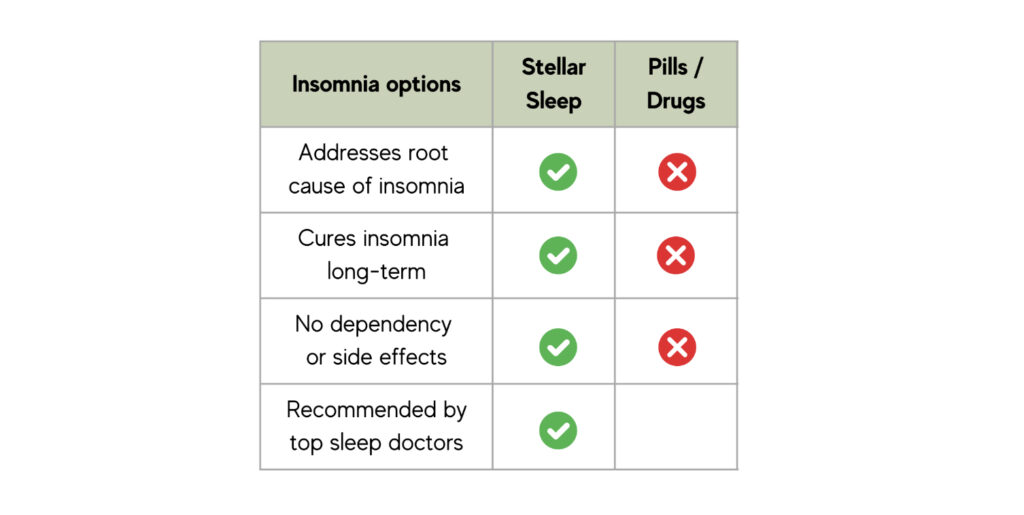
Are sleeping pills the best solution for insomnia, or are they just a quick fix hiding underlying problems? Let’s discover the truth.
It’s a common scenario: lying in bed, staring at the ceiling, waiting for sleep that just doesn’t come. Then, out of desperation, you reach for the bottle of sleeping pills on the nightstand. It feels like a solution, a way to finally get some rest. But is it really fixing the problem? The fact is that many of us have been led to believe that a pill can cure insomnia, offering a quick path to dreamland. Yet, the reality is more complicated. Sleeping pills might help you doze off faster for a night or two, but they don’t tackle the underlying issues causing your sleepless nights. What’s the reason for this? Let’s explore.
It’s easy to fall into the trap of believing in quick fixes for insomnia, especially when you’re desperate for a good night’s sleep. But how much truth is there in these widely accepted notions? Let’s dispel some of the most common myths associated with insomnia:
Reality: Insomnia is often rooted in deeper psychological or lifestyle issues, such as anxiety, stress, or burnout. It’s a complex condition that reflects broader health and wellness challenges, not just difficulty falling asleep.
Reality: While medication may offer a quick fix by inducing sleep, it doesn’t cure the underlying causes of insomnia. Effective treatment involves addressing these root issues, which pills alone cannot do.
Reality: The body can build tolerance to sleep medications, making them less effective unless the dosage is increased. This can lead to a cycle of dependency and expose individuals to the risk of side effects.
Beyond the immediate relief they offer, sleeping pills can introduce a variety of side effects and lead to dependency. Unfortunately, this is a risk that’s often overlooked in the quest for better sleep. Here’s what you need to know:
 CBT-I: An Effective Alternative to Medication
CBT-I: An Effective Alternative to Medication
Acknowledging the challenges and limitations of sleeping medication leads us to seek better, more sustainable solutions for insomnia. This is where Cognitive Behavioral Therapy for Insomnia (CBT-I), a cornerstone of Stellar Sleep’s approach, comes into play. So, what is CBT-I? It’s a comprehensive treatment strategy that tackles the psychological and behavioral patterns disrupting sleep. It’s proven to improve sleep quality and sustain these benefits long-term without the side effects associated with sleeping pills.
Let’s take Queenie M.’s experience as an example. Facing insomnia triggered by workplace stress, Queenie found herself in a vicious cycle of sleepless nights and daytime fatigue. Traditional sleeping medications offered no relief and came with unwanted side effects. Turning to Stellar Sleep, she discovered a program that fit seamlessly into her life, requiring minimal time commitment while providing the tools to build a healthier sleep routine.
In fact, our program alleviated the pressure to sleep by conventional standards, allowing her to find restfulness on her own terms. The result? Waking up feeling refreshed, even on less sleep than previously thought necessary. Queenie’s story underscores Stellar Sleep’s belief that understanding and tackling the root causes of insomnia through CBT-I can free individuals from the cycle of dependency on sleeping pills, leading to naturally restful nights and energized days.
At the end of the day, the path to better sleep without relying on pills is a powerful decision. However, recognizing that sustainable solutions like CBT-I can effectively address insomnia lays the foundation for lasting change. With Stellar Sleep, you have access to expert guidance tailored to your unique sleep challenges. So, take those initial small steps, knowing that enhancing your sleep health isn’t just possible – it’s within reach.
Treatment-Resistant Insomnia: When Sleeping Pills Don’t Work | WebMD
Insomnia: Should I Take Sleeping Pills? | Government of Alberta
Prescription sleeping pills: What’s right for you? | Mayo Clinic
Sleeping Pills: Types, Side Effects & Treatment | Cleveland Clinic
Surprising View of Insomnia and Sleeping Pills | PubMed
Related Posts